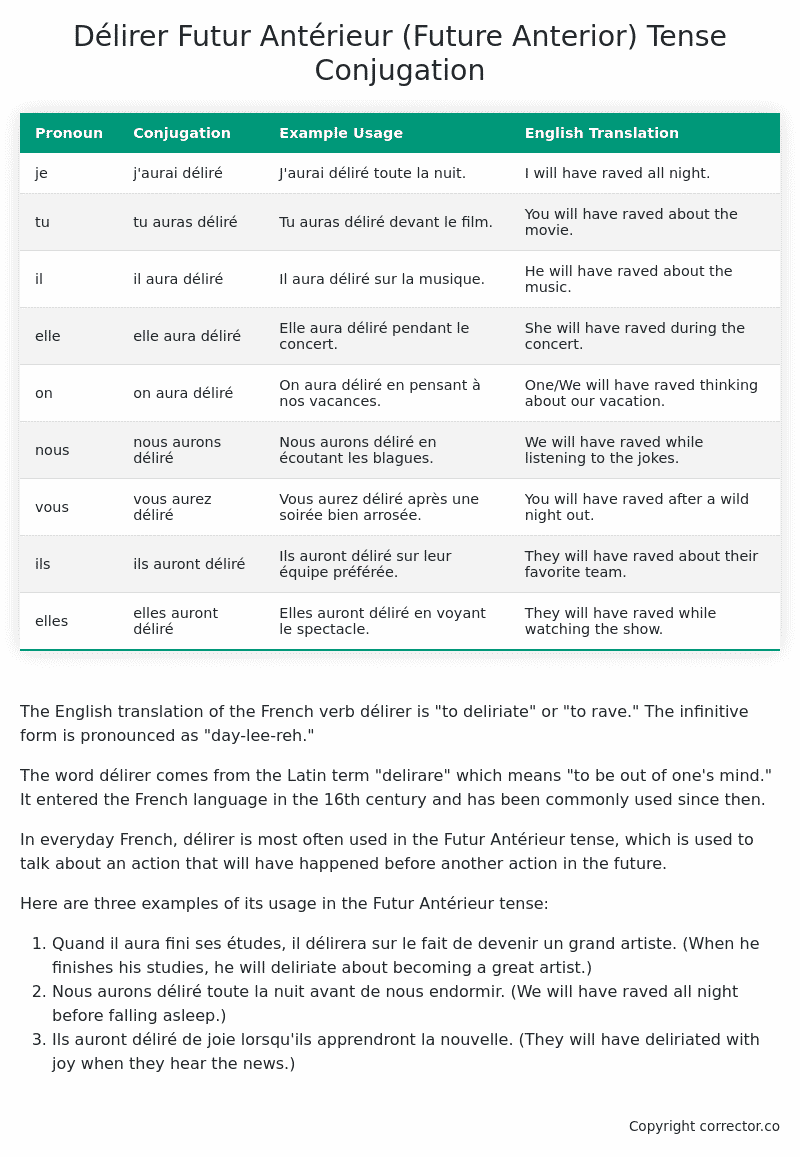Futur Antérieur (Future Anterior) Tense Conjugation of the French Verb délirer
Introduction to the verb délirer
The English translation of the French verb délirer is “to deliriate” or “to rave.” The infinitive form is pronounced as “day-lee-reh.”
The word délirer comes from the Latin term “delirare” which means “to be out of one’s mind.” It entered the French language in the 16th century and has been commonly used since then.
In everyday French, délirer is most often used in the Futur Antérieur tense, which is used to talk about an action that will have happened before another action in the future.
Here are three examples of its usage in the Futur Antérieur tense:
- Quand il aura fini ses études, il délirera sur le fait de devenir un grand artiste. (When he finishes his studies, he will deliriate about becoming a great artist.)
- Nous aurons déliré toute la nuit avant de nous endormir. (We will have raved all night before falling asleep.)
- Ils auront déliré de joie lorsqu’ils apprendront la nouvelle. (They will have deliriated with joy when they hear the news.)
Table of the Futur Antérieur (Future Anterior) Tense Conjugation of délirer
| Pronoun | Conjugation | Example Usage | English Translation |
|---|---|---|---|
| je | j’aurai déliré | J’aurai déliré toute la nuit. | I will have raved all night. |
| tu | tu auras déliré | Tu auras déliré devant le film. | You will have raved about the movie. |
| il | il aura déliré | Il aura déliré sur la musique. | He will have raved about the music. |
| elle | elle aura déliré | Elle aura déliré pendant le concert. | She will have raved during the concert. |
| on | on aura déliré | On aura déliré en pensant à nos vacances. | One/We will have raved thinking about our vacation. |
| nous | nous aurons déliré | Nous aurons déliré en écoutant les blagues. | We will have raved while listening to the jokes. |
| vous | vous aurez déliré | Vous aurez déliré après une soirée bien arrosée. | You will have raved after a wild night out. |
| ils | ils auront déliré | Ils auront déliré sur leur équipe préférée. | They will have raved about their favorite team. |
| elles | elles auront déliré | Elles auront déliré en voyant le spectacle. | They will have raved while watching the show. |
Other Conjugations for Délirer.
Le Present (Present Tense) Conjugation of the French Verb délirer
Imparfait (Imperfect) Tense Conjugation of the French Verb délirer
Passé Simple (Simple Past) Tense Conjugation of the French Verb délirer
Passé Composé (Present Perfect) Tense Conjugation of the French Verb délirer
Futur Simple (Simple Future) Tense Conjugation of the French Verb délirer
Futur Proche (Near Future) Tense Conjugation of the French Verb délirer
Plus-que-parfait (Pluperfect) Tense Conjugation of the French Verb délirer
Passé Antérieur (Past Anterior) Tense Conjugation of the French Verb délirer
Futur Antérieur (Future Anterior) Tense Conjugation of the French Verb délirer (this article)
Subjonctif Présent (Subjunctive Present) Tense Conjugation of the French Verb délirer
Subjonctif Passé (Subjunctive Past) Tense Conjugation of the French Verb délirer
Subjonctif Imparfait (Subjunctive Imperfect) Tense Conjugation of the French Verb délirer
Subjonctif Plus-que-parfait (Subjunctive Pluperfect) Tense Conjugation of the French Verb délirer
Conditionnel Présent (Conditional Present) Tense Conjugation of the French Verb délirer
Conditionnel Passé (Conditional Past) Tense Conjugation of the French Verb délirer
L’impératif Présent (Imperative Present) Tense Conjugation of the French Verb délirer
L’infinitif Présent (Infinitive Present) Tense Conjugation of the French Verb délirer
Struggling with French verbs or the language in general? Why not use our free French Grammar Checker – no registration required!
Get a FREE Download Study Sheet of this Conjugation 🔥
Simply right click the image below, click “save image” and get your free reference for the délirer Futur Antérieur tense conjugation!

Délirer – About the French Futur Antérieur (Future Anterior) Tense
Construction
Common Everyday Usage Patterns
Interactions with Other Tenses
For example
Summary
I hope you enjoyed this article on the verb délirer. Still in a learning mood? Check out another TOTALLY random French verb conjugation!


